
Welcome back to Registering the Registry, where we consider and review the films inducted into the Library of Congress’ National Film Registry by merit of their cultural, historical, and aesthetic qualities! This time, one of America’s favorite trashmeisters breaks through into the wider public consciousness with a Divine-shaped sledgehammer against good taste, challenging previously held notions about queer film, arthouse film, amateur film… pretty much every kind of moviemaking in the process. From 1972, it’s Pink Flamingos, and the reader best be braced for discussion about some gnarly topics. Onward we go!
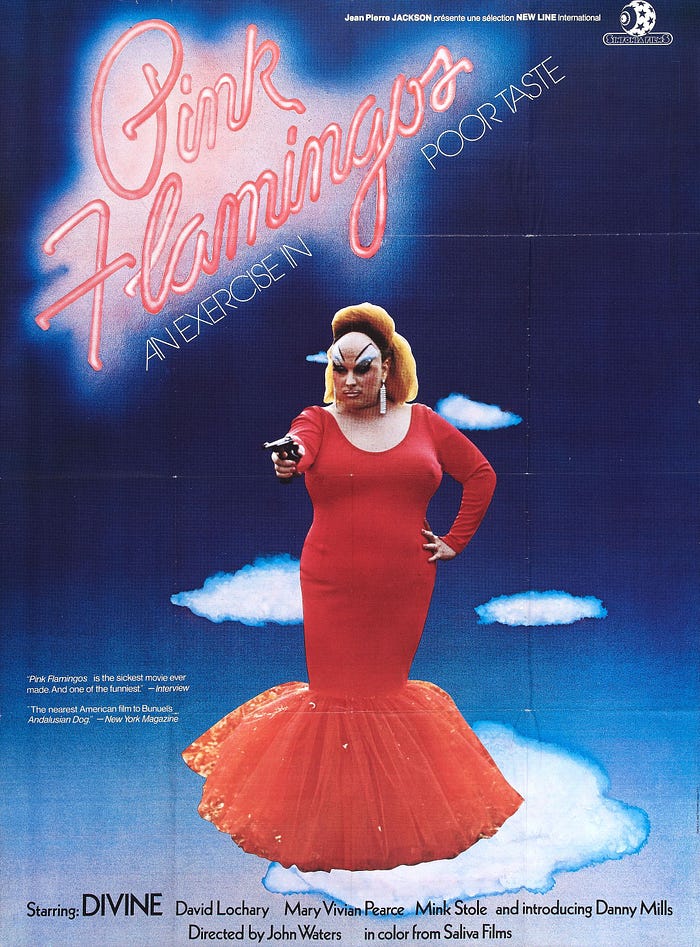
***
Y’know, prior to rewatch, while knocking ideas for focus and direction on this piece around my head, two potential avenues coalesced, both of which relied on using Pink Flamingos as a cudgel. The first was some vague notion talking about the present worrying trend for right-wingers to blanket tar their enemies and intended targets as perverted degenerates, followed by a pivot to championing this early John Waters work as a TRUE example of degenerate perversion, an honest masterclass in the demented nothing like the innocent people under assault who’re just trying to live their lives. For the other, there was an even vaguer notion of hopping up and down while making a spectacle out of the Library of Congress inducting a good ’n’ proper DANGEROUS movie into their ranks, hyping up how disgusting and unwatchable and cutting-edge the film remains today, run a whole celebration on its filth as THE reason to preserve its contents. Neither of these ideas developed much, nor did they survive actually rewatching the film, for neither much speaks to what makes Pink Flamingos special or worth watching. True, the film goes against the hypocrites who engages in what they call vile activities while casting stones at anyone doing the same, and true, the film contains several passages during which I simply cannot look at the screen, but this is a John Waters joint under discussion. This here’s a movie from the same man who’d go on to direct Hairspray, Serial Mom, Cry-Baby, A Dirty Shame, pictures whose hearts speak to a loving and accepting attitude no matter how clean or grody their actual contents, no matter how much polish and refinement they display over these rough early days when promising a distributor a more refined product than Multiple Maniacs meant filming in color and holding the camera a little steadier. To speak on Pink Flamingos’ virtues truly and accurately is not to use it as a weapon; it is to embrace it as social art.
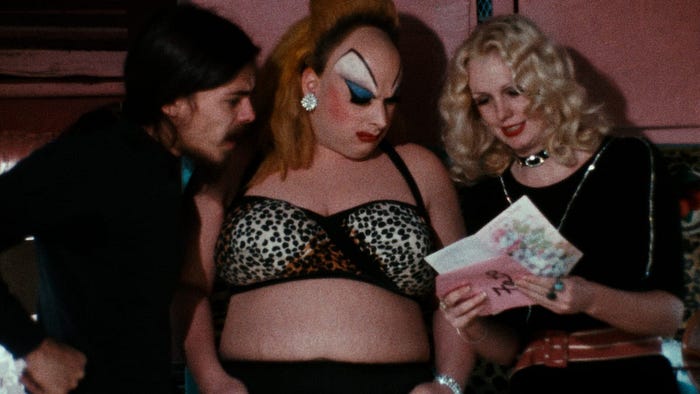
Granted, if you know a thing or twenty about Pink Flamingos, the descriptor there might raise an eyebrow, given the picture’s the epitome of This Movie Contains Scenes. If you don’t know Pink Flamingos from Polyester, allow me to frontload this review with a quick rundown of Things What Are True About Pink Flamingos Insofar As They Really Happen In The Movie. Content warning: everything.
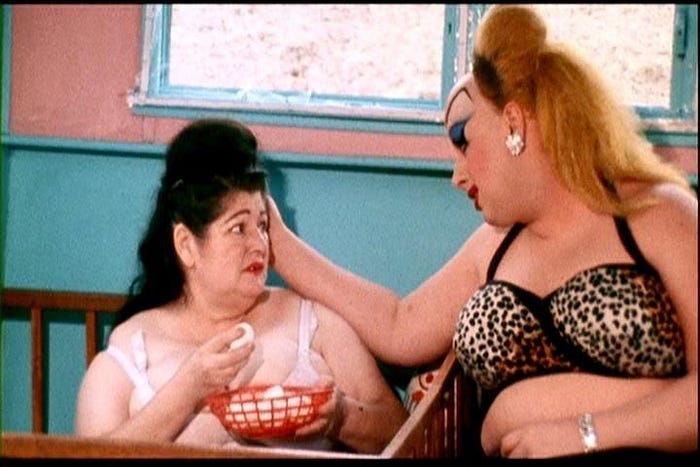
Divine (real name Harris Milstead), a 300-pound drag queen with head half-shaved to accommodate enormous winging makeup and dressed in a variety of outrageous feminine outfits, is seen strutting through Baltimore in the wake of her declaration as The Official Filthiest Person Alive, shoving an entire raw steak inside her underwear before squatting to relieve herself and wipe in public. Her mother Edie (Edith Massey) sits in a playpen inside their trailer, dressed only in oversized underthings, constantly creeching for eggs and the Egg Man, dribbling and slobbering the eggs all over herself when she finally gets them while cackling like a child at stories about Humpty Dumpty. Son Crackers (Danny Mills) brings young woman Cookie (Cookie Mueller) to his shack behind the shed where he proceeds to rape her while forcing live chickens between their bodies and into her face, drawing blood and half-crushing the poultry between their thrusting bodies while travelling companion Cotton (Mary Vivian Pearce) watches and moans through a wired window. Cookie acts as a spy for Connie and Raymond Marble (Mink Stole and David Lochary), a couple who believe they should be recognized as the filthiest people alive on account of their baby harvesting ring in which they kidnap young transients, lock them in a dungeon, force their manservant Channing (Channing Wilroy) to impregnate the girls, and then sell the newborns to lesbian couples and flip the cash to fund a heroin ring in local elementary schools. Channing is at one point seen to masturbate in front of a screaming woman before collecting his semen in an eye-dropper and inseminating a passed-out woman in close-up on her crotch. The Marbles are furthermore fond of sixty-nining each other’s toes and orgasmically screaming their dirtiness to the heavens in fully nude glory between rounds of yelling at people over the phone, and Raymond is particularly fond of flashing passers by with a sausage attached to his dick so he can steal their purses after they run away, although he is at one point defeated when a pre-op trans woman (Elizabeth Coffey) decides to waggle her goods his way in return.

Pink Flamingos furthermore brings us Divine’s birthday party, during which time her mother gets hitched to the Egg Man, everyone gets blitzed on uppers, strippers put on outdoor shows, and one man strips naked, raises his ass to the camera, and repeatedly prolapses his anus in mock-lipsync to “Surfin’ Bird.” The Marbles call the police, but Divine, her partygoers, and at least one person in a Nazi armband get the jump on the cops and rip them to shreds, eating them in an homage to Night of the Living Dead. In an effort to get back at the Marbles for ruining her party and mailing her a turd besides, Divine and Crackers break into the couple’s home and spend an uncomfortable amount of time licking everything to place a curse on the domicile, culminating in Divine giving her son a chaser blowjob in close-up. Meanwhile, Mink Stole almost sets herself on fire on-camera as she swings about the torch used to burn Divine’s trailer to the ground. While Divine does eventually capture the Marbles and put them on trial before the press in a self-described kangaroo court before humiliating and executing them, none of her screaming advocacy to celebrate filth and eat shit can quite equal the REAL climax, when Divine drops to her knees, scoops up fresh dog excrement, and jams it in her mouth to create a literal shit-eating grin for the final shot. Oh, and if you’re watching a version of the film pressed before its 25th anniversary rerelease in 1997, pretty much all the music in the film was used without a proper license, which is probably the biggest real punishable-by-the-law crime in the film excepting the thing with the chickens. Remember the chicken sex? Good times before the singing asshole and the incestuous blowjob and the dog shit.
(Also: the film’s dedicated to the Manson family, a move over which Waters has later expressed regret.)
All of this is True about a film performed, shot, and cut with such amateurish verve as to prime an unfamiliar observer into thinking John Waters really did find some dangerous and disgusting people living out on the edge of society willing to do anything for money and simply recorded them engaged in their everyday activities. A properly informed observer, however, will know John Waters ACTUALLY found some dangerous and disgusting people living out on the edge of society willing to do anything for money and simply recorded them following a preplanned script to get mainstream attention. In all seriousness, Waters hails from a background of a heavily conservative 50s and 60s Baltimore upbringing, one in which he felt stifled until his parents nurtured his unconventional interests by getting him into puppetry and later home moviemaking. An outcast for his preoccupations over B-movies, weird arthouse fare, drag, shock humor, and not incidentally his homosexuality, the man’s early work was decidedly and consciously fringe, strange experimental short films and outright abrasive features made using the same cast and crew of friends from similarly long-stifled and freshly-rebellious backgrounds not only because he had few other options, but because they legitimately enjoyed working together and pushing boundaries in their own idiom. Though designation as a Dreamlander has expanded over the years to include anyone who’s worked on more than one Waters production, back in these early days it meant a tight-knit group of weirdos and outcasts on society’s outer rim whether by societal pressure or by choice, happily clumped in lacking conditions and getting attention the only way they knew: by taking that which made polite society retch or recoil, putting it in front of a movie camera, and extremifying until the retchers and recoilers laughed, or cheered, or both.

It’s by this metric I mean when I call Pink Flamingos a loving and celebratory piece of social art despite the defecation and cannibalism and crossing Taboo Street ninety times an hour. You can tell Waters is making this movie in large part to elevate his friends on the highest platform available and shout to the world, “Hey, everyone! LOOK!” in hopes they’ll see what he sees. He plainly adores any chance to put Divine before the camera in all her outrageous, larger-than-life glory — she gets plenty long-winded speeches extolling her own divinity, scenes in which she lives up to the script’s conceit of her as a criminal by grabbing wiry dorks by their collars to growl in their face or stomp about as a Godzilla in drag (as Waters called her), and yet Milstead is accorded equal chance to turn his acting talents towards rendering Divine a sweetheart who cherishes her mother and son and partner, even if said cherishing sometimes manifests as excessive eggy babying or fellatio. He treasures all scenes containing Edie and her aged croaky voice, sitting there in her playpen reading her childish dialogue straight as an arrow without a hint of guile, rerouting all attention to her excitement over those thin-shelled ovums of domestic foul whenever she strikes up off-tune. Crackers he loves for the sheer intensity of the man’s every movement and line-read, Cotton he loves as a gentle presence who’s ready to Shoot Gun and Chop Dick at first opportunity, Paul Swift’s Egg Man he loves for simple aching sincerity, and on and on we go. From the total criminal family unit who are presented as righteous and more functional than the standard nuclear family in the face of hypocrisy even when they’re ordaining an extrajudicial execution to the smallest one-scene part of the Singing Asshole or the Chick With A Dick, there’s a strong sense throughout that the shock value of his intended sequences came distant second, the “everybody’s gonna come and see a drag queen eating shit no matter what, and I want YOU to be my drag queen eating shit because you deserve to be a STAR!” value a distant first.
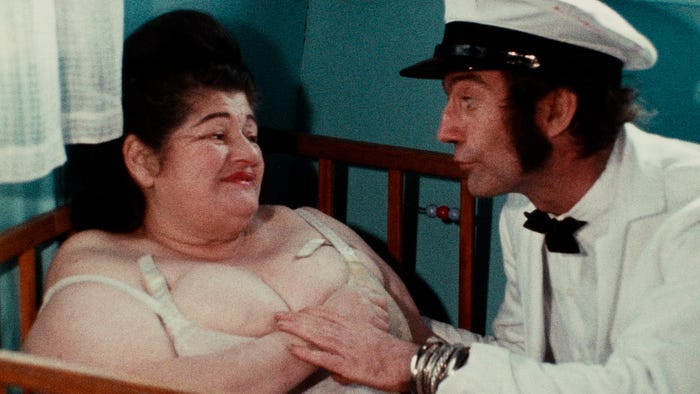
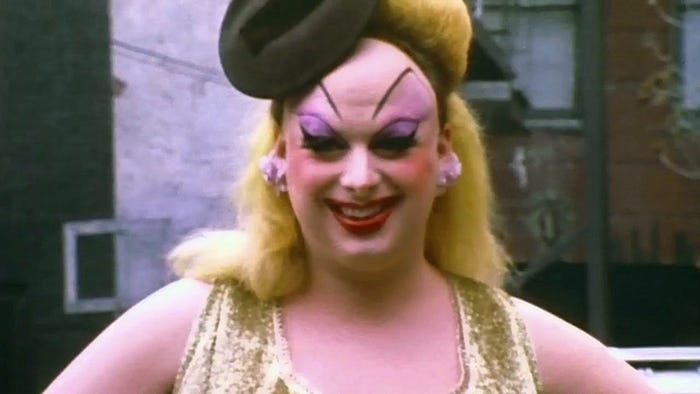
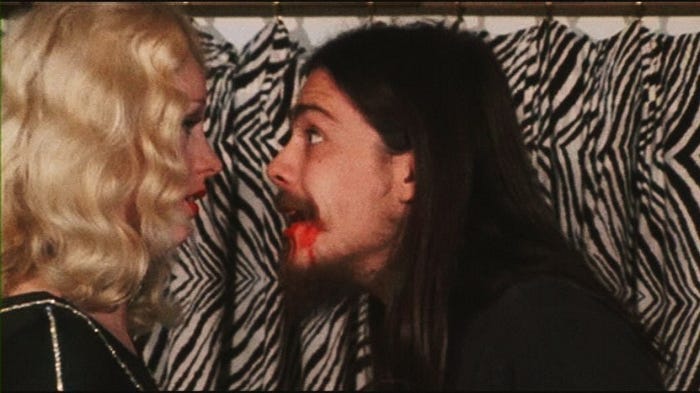
You get much the same sense around the antagonistic characters here, though of a slightly different bent. The Marbles aren’t exactly afforded the same tender hand as protagonists despite both clans’ willful criminality and disregard for human life when it suits their purposes, largely cause the Marbles are so preoccupied with filthiness and transgression as a contest of performative cruelty, they cross from filthiness into assholery to prove their dirt worth, and are willing to cooperate with the very authorities whose standards they flaunt to get their way. No, Waters expresses his love solely for Stole and Lochary as performers who can dig into his trademark ranting dialogue and come back with compulsively watchable results like no others. These two are mean, petty on principle, self-righteous, brash, crass fuckers who can and will launch into a foul-mouthed thesaurus-fueled tirade against whatever displeases them for minutes on end before cycling back to extol their own tarnished virtues in the fields of muck and slime. While Stole’s handily the better at it (holding as she does the title Undisputed Master of John Waters Raving), I find Lochary holds his own in the supporting role thanks both to the character’s conception as slightly less dedicated than his wife and the amusing cheap shots of coming in after Stole’s exhausted her reserves to keep the pissy kicking going before she recharges for another round. They own every transition from lounging about declaring victory to screeching about outrage and scandal and revengeance at drop of a hat, and you can practically feel Waters behind the camera motioning with his hands for more more more more. That they occasionally victimize and bully Wilroy (especially when they discover him in dual drag as the pair), only for his castration to prompt the biggest and rawest-throated Stole Scream of all makes the matter all the clearer. Don’t matter whether you’re here as an ennobled shit-kicker or a legit scumbag; be Enough in front of the camera and Waters is gonna adore you to pieces.
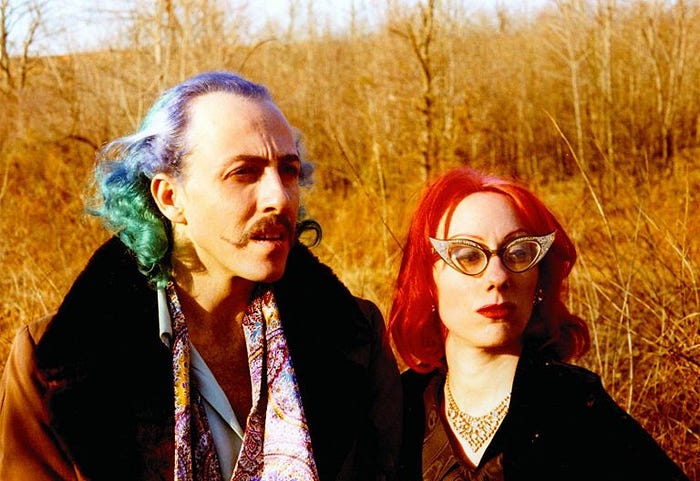
Hell, not only does Waters treasure his stars, he respects them as well. The film contains full credits for absolutely every actor and extra hired for even a single lousy day’s work, but the man also went out of his way to advise any sensitive family members away from seeing their kin make a public spectacle of themselves, and kept the Singing Asshole actor’s name under wraps until his death a few years back, so as to let him lead a life without press and fans constant asking after his talent. Nothing guards a film against charges of exploitation like dedication to preserving dignity to this degree.
Course, within all this talk about affection and admiration and adulation, we do have to remember Pink Flamingos is out here to push boundaries and tweak noses and violate good taste, which in turn means there are portions in which Waters goes too far and does exploit some. On the matter of whether or not his perversions are easy to watch, that’ll be different for every observer — my part, the blowjob and dog shit parts are “cover the screen until it’s over” moments, but I wasn’t as disgusted by the prolapsing anus I thought I might be from memory, instead spending the sequence staring long down the flapping hole and wondering how I ever thought the guy successfully synced it in time with the “a-ba-ba-ooh-mama-mow-baba-ooh-mah-ma-maow” from the Trashmen rather than just kinda making it open and close once a second. What I’m talking about is, again, the chicken stuff, which constitutes animal abuse for entertainment no matter how you slice it. Don’t care much for Waters’ justification in his museum curator segments while talking about deleted scenes in the ’97 rerelease. Regardless whether you humanely kill and cook it right after, a chicken doesn’t have any concept of what’s going on when actors use it as a two-in-one sex toy and torture device, and even if we assume sometimes a sick fuck or two pleasures themselves with the birds before putting ’em on the chopping block in the meat industry, the vast majority don’t film and distribute the act for pleasure. It’s just too too muchprodduing using actual cruelty to sit comfortably alongside the delighted faked cruelty elsewhere as part and parcel with the whole film. Y’didn’t kill anyone for realsies when you had the partygoers eat the police or Dvine shoot the Marbles; the shock of one character raping another is handily enough of a system smack to not do something legitimately morally reprehensible for an extra dose in the midst of filming the playtime version of line-crossing. Feathered bird dummies and dubbed squawking woulda sufficed, John.
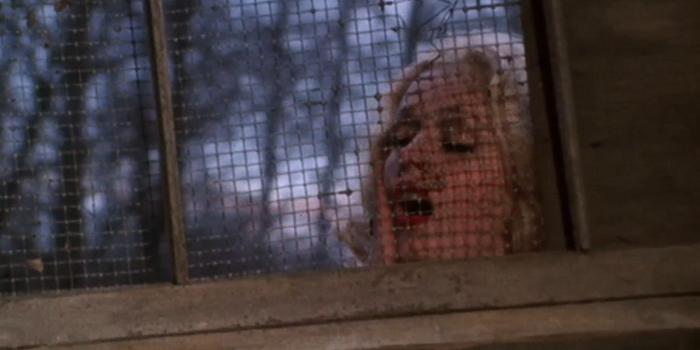
Point being, in seeking to achieve odiousness and by so doing attract mass attention, Pink Flamingos goes too far as button pushers and standard violators are oft prone towards. If we can accept it is now far too long past any statute of limitations to cast a fine upon Waters’ head*, though, I think it worth considering how he and his use this offense as foundation for an immensely social piece of art. Consider the original theatrical trailer, which, as Waters will enthusiastically note in every interview, commentary, and retrospective, contains not a sliver of footage from the film itself, instead presenting crowd reactions immediately after an early screening. Though a curated piece of ad copy, the emphasis isn’t on how these sights send audiences screaming for the hills or shatter the borders of acceptability, nothing so puerile as the narcissistic “nobody but the truly hardened and cynical can handle what we’re gonna show you” mindset of your South Parks or a great slew of online shock comedy. We’re focused on how Divine’s outrageous adventures bring the house down laughing, leave crowds satisfied whether they were on the movie’s wavelength or not, forms a great magnet for folks to turn out in the midnight hour so they might experience this tale of malformed perversion together. The film’s reputation in the decades since release holds with this presentational style — not something you watch on your own, but something you drag friends into, whether you’re trying to shock them with first exposure or forming a cult around the experience. (I certainly took advantage of the great tradition to get an unexposed friend in on the action while rewatching for this project!) In this the watching experience matches the contents wonderfully, a troupe of outsiders playing extremified versions of themselves committing bits and bobs of grotesquery viewed by either outsiders clumped in their own circles or those willing to get in close for a better view.
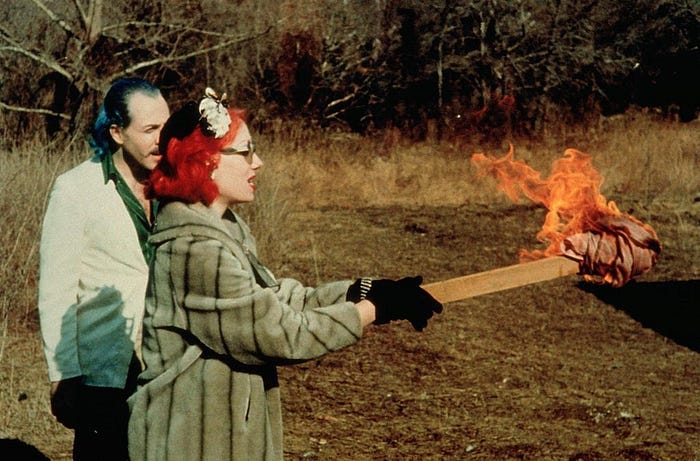
I defer to something Waters says towards the end of Steve Yeager’s 1998 behind the scenes documentary Divine Trash, regarding the shit eating at the end. For all the staged illegalities present in the film, the killings and the incest and the lauding criminal lifestyles and the kidnapping and the rape and the humiliations upon humiliations, the movie ends on something undeniably disgusting yet not banned by any nation, not explicitly condemned by any religious text, not considered an active pressing societal ill, because practically the only bodies who’ll do it willingly as a matter of course are children and animals. I gag and avert my gaze when Divine flashes her crap-coated teeth and poses with the still-steaming lump sitting on her tongue, but it is pure juvenilia, schoolyard antics, a climax pitched at the low low level of “nyah nyah, betcha won’t do THIS!” which drags the entire picture down with it. Not dragging down in a negative sense you’ll understand, dragging down by means of retroactively softening the slew of preceding blows. If the great final violation is Divine following through on the hardest triple dog dare a six-year old can imagine, hardly anything you just saw can be counted as dangerous or subversive, or anything other than a rather exaggerated lark. We are ultimately all of us here to have some fun, revel in the disgusting without shame, understanding it’s MOSTLY acting and wilding out for a few minutes on the more excessive stuff. A picture made with hate in its heart would not attract the long-standing devotion Pink Flamingos enjoys, nor would a picture made to consciously challenge societal standards at an adult level produce a latter-day career like John Waters’, nor would a picture made with anything less than enthusiasm for making one’s friends dance and play the carnival geek given new vocation under expectation everyone will find the act exhilarating too remain so watchable after presenting so many scenes I flat out cannot actually watch.

Inna final analysis, there’s precious little material difference between the animating spirit behind Pink Flamingos and the artistic impulses at the bones of a family feature like Hairspray. The latter might not indulge coprophagia or crush fetishism or artistic castration, but the 300-pound drag queen is still there as someone you’re meant to view as one of the most wonderful people in the world amidst a cast of creeps and freaks and queerdos opposed by those who simply will not admit they’re dysfunctional and janky people too. No matter where you stand in the thirty-five year span of John Waters’ directorial career, you’ll find the man and his Dreamlanders exalting the virtues of strangeness, queerness, and filthy filthy politics. Pink Flamingos is just the one loudest, proudest, and most explicit about its points, which is why it’s deserving induction to the Registry before any earlier or later Waters production. Too far back and he hasn’t found quite the right equilibrium yet, too far forward and he’s effectively challenged ’n’ transformed the landscape. Here at this particular historical wedge do we find him changing the world for the better by imitating a local radio personality to play sideshow barker as promotion for people he admires going places no one else will tread for YOUR enjoyment. No matter of eating shit to force someone you don’t like to smell your breath; we’re eating shit because it makes us happy and folks’ll line up round the block to see whether we really done it, and maybe think a little kinder on those who did after. S’admirable after a fashion, although I’ll keep my distance from the one who scarfed doodoo all the same. Viva depravity!
(*Yes, this does mean I consider it easier to look past actors acting out a crush fetish with chickens fifty years ago than a director making his prepubescent son simulate sex with a naked woman around the same time.)
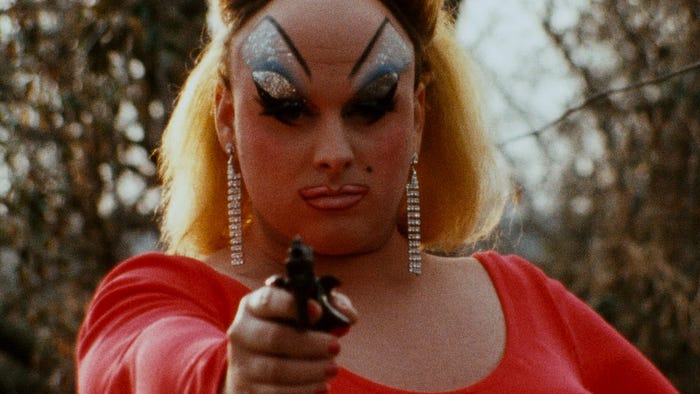
***
Hey, y’made it! Congrats on getting through a particularly sweary article. Now’s your turn to cuss and discuss unmentionables, cause I wanna hear from you in the comments — about the film itself, Divine, John Waters, their place in American society, the ethics of eating dog turds, whatever you like! Just hash it out and keep your eyes peeled for another piece two weeks hence. It’ll be an adaptation of the beloved William H. Armstrong young adult novel about a young sharecropper’s son and his struggles to stay afloat and walk steady after tragedy befalls his father and beloved dog. From director Martin Ritt and starring Kevin Hooks, we’re talking 1972’s Sounder, which you can get for free through tubi, Kanopy, Fandor, and Plex, or rent/purchase through YouTube or Amazon. See you then!

Gargus may also be found on Letterboxd, tumblr, twitter, ko-fi.
Registering the Registry is sponsored by Adept7777 and Dan Stalcup on Patreon.